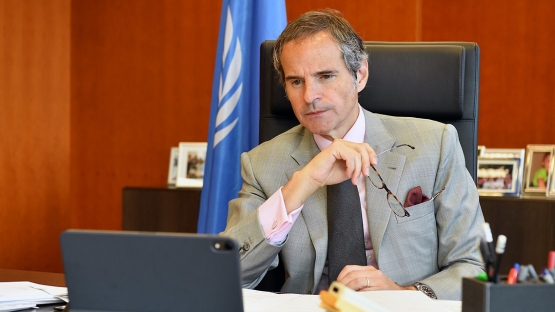IAEA Director General Rafael Mariano Grossi said nuclear power is playing an important role in the world’s production of clean energy, “contributing massively” to avoiding greenhouse gas (GHG) emissions in many countries and providing innovative solutions that could be very useful to emerging economies.
Grossi spoke today as part of a panel discussion on electricity security and sustainability at the International Energy Agency’s Clean Energy Transitions Summit. The virtual event brought together ministers and senior figures from around the world to discuss “measures to boost economies, create jobs, reduce global emissions and make energy systems more resilient” amid the economic slowdown during the global pandemic, according to the Paris-based IEA.
“Nuclear power has a great deal to contribute as part of clean, resilient, inclusive energy systems, which are of course indispensable drivers of economic development, especially at this hard time of pandemic recession all over the world,” Mr Grossi said. “Nuclear energy is not a promise in terms of low carbon energy, it is already now today contributing massively to a low carbon economy and a green grid” by avoiding the equivalent of 55 gigatonnes of carbon dioxide emissions over the last 50 years, he added.
Nuclear power, which emits no carbon dioxide during operation, currently provides about 10% of the world’s electricity, which amounts to around one third of all low carbon electricity. Some 54 nuclear power reactors are under construction around the world, two thirds of them in Asia.
“We believe that there is no one-size-fits-all solution to the complexities of the energy markets and the challenges we are facing,” Mr Grossi said. “What we say is that nuclear (power) has indisputably a place at the table.”
The IAEA Director General emphasized that nuclear power helps to provide stability to electrical grids, particularly those with high shares of variable renewable sources that depend on sunshine or wind. He noted that nuclear power plants can operate flexibly by following demand and limiting the impact of seasonal fluctuations in renewable output and can also bolster energy security by lessening reliance on imported fuels.
When it comes to electricity security and sustainability, Mr Grossi said technological innovation is key.
“Nuclear energy is at the forefront, at the vanguard, with development of solutions like small and medium sized reactors, which will be very useful for evolving, emerging economies in the near future,” he said. Nuclear power can also contribute to the future production of hydrogen without GHG emissions, for use in energy storage, transportation, industry and other applications, he added.
Recalling his participation in last year’s COP25 climate conference in Madrid, Mr Grossi said the Agency will continue to take part in major global energy and climate discussions including COP26 next year in Glasgow, United Kingdom.
The IAEA welcomes an open, constructive dialogue “based on facts and not ideological or simply aspirational ideas,” he said. “We have to be ambitious and nuclear energy has a lot to contribute.”






